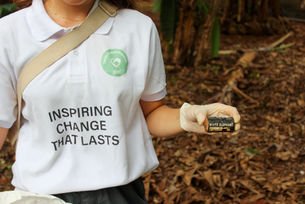
Waste Management Mtende

The Problem:
When you walk through rural Zanzibar, something becomes painfully clear: waste is everywhere. Plastic is thrown on the ground, burned, or buried. And it’s not because people don’t care – it’s because no one ever told them otherwise.
For years, there has been no public waste collection in rural areas. The government does little, and plastic packaging was introduced far too quickly without any education. Many still believe plastic will decompose - just like a mango. Others simply don’t see another option.
We decided it was time to change that – step by step, and together with the community.
Our Vision?
Not just a clean village.
But a community that knows why it matters – and feels part of the change.
Step 1: Awareness & Education
Before we cleaned the village, we had to shift mindsets.
We started by talking to people. Listening. Understanding their habits and beliefs. And then teaching:
-
What happens when plastic ends up in our soil, our oceans, our food?
-
Why proper disposal matters – not just for aesthetics, but for health.
-
We visited the local school to work with the youngest generation – with games, visuals, and hands-on learning.
-
We provided the first public trash bins and encouraged students to become ambassadors of change.


Step 2: Weekly Trash Collection
We hired and trained three amazing young men from the village. Every week, they collect trash from the streets and fields.
The waste is then picked up by a private company and transported to the Kibele landfill, the only official disposal site on the island.
It's not perfect. But it's a huge first step.
Step 3: Community Clean-Ups
We organize village-wide clean-up days where local volunteers – including women and children – collect waste together. In return, they receive a small thank-you: a ZEHO T-shirt and a shared meal.
At the same time, we use the opportunity to share knowledge:
We ask questions, explain key facts, and reward kids who collect trash with small gifts like pens or notebooks.
Participation is growing – and so is awareness.


Step 4: Making Waste Visible and Easy to Manage
To support the weekly trash collection, we’ve placed large waste bags in central spots around the village. This gives everyone a simple and accessible way to dispose of their rubbish properly.
Next to the bags, we’ve put up informational signs with the question: “How long until it is gone?”
They show how long different types of waste stay in nature – from banana peels to plastic bottles. It’s a gentle reminder of why proper disposal matters.
These signs and collection points help people make more informed decisions in their everyday life – and they show that small actions can lead to real change.
What’s Next?
We’re just getting started- over the coming months, we plan to:
-
Install more public waste bins in key places like schools, shops, and along main roads.
-
Launch a door-to-door education campaign, so that every household understands why waste matters and how they can take action.
-
Continue building local ownership by training young people and working closely with the village health committee.
We’re also preparing to expand:
-
In Nungwi, we are supporting the development of a waste system by focusing on education and community awareness
-
In Jambiani, first conversations are underway.
Why Your Support Matters
With just:
-
$25 you can buy equipment for a trash collection point
-
$50/month, you cover the waste collection for an entire village
-
$80/month, you pay the salaries of three young locals doing weekly trash pick-up
-
$250, you fund an entire community clean-up – including T-shirts and a shared meal for all volunteers










